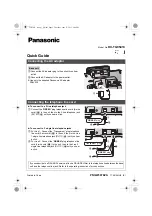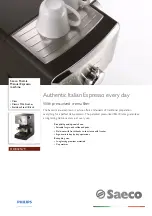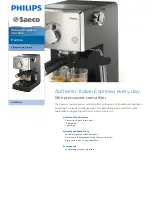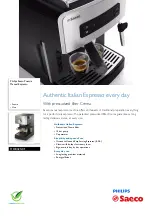
Data ultimo aggiornamento: 04/04/2018
Pag. 14 di 60
SPECIFIC OPERATOR SAFETY INSTRUCTIONS
WARNING:
the use of propane requires that specific safety precautions are
understood and followed for safe operation.
The following provides the basics of using propane gas. It is, however,
strongly recommended that employees or users who run Propane-powered
machines are properly trained on all aspects related to safety of the propane
use .
The employer must ensure his employees a certified training use of the
machine in order to ensure:
• information and training for the use of propane machine and devices;
• to make all users aware of propane equipment recommended standards of
the National Fire Protection Association (NFPA).
Training in the use of devices that use propane, refer to the local regulatory
authorities and with the requirements of NFPA 58, that can be consulted on
the website www.NFPA.org
DANGER:
work with this machine only and exclusively outside. It is the
operator’s and or owner’s responsibility, or the project supervisor
to ensure this requirement. Working in an closed area not
well ventilated may cause illness, injury or death by poisoning due to
exposure to carbon monoxide (CO).
DANGER:
these machines emit CO, which is a colorless, odorless gas. Early
symptoms of exposure to CO include headache, drowsiness, dizziness and
nausea. If any of these occur while operating the machine, switch off the
machine and go outside in the fresh air. Have the machine tested for CO
emissions by a specialist before using the machine again.
DANGER:
high or prolonged exposure to CO can cause vomiting, confusion,
loss of consciousness and muscle weakness. If you
experience these symptoms, call the emergency medical assistance. If you
have experienced these symptoms, do not use the propane machine until
received medical care
and excluded possible CO poisoning. Excessive exposure to CO can cause
death.
DANGER:
propane is a highly flammable fuel.
If you smell propane (propane is odorized), do the following:
1. Stop the engine: turn the key switch to the off position. Do not
touch any electrical switches
2. Shut off the service valve on the propane cylinder.
3. Move the floor machine to a well-ventilated area.
4. Remove the cylinder from the machine and take it outside the building.
5. If the cylinder is leaking, contact a DOT approved repair shop to determine
the cause of the leak and have the shop, not you, repair it.
If a fire occurs while the machine is being operated do the following:
1. Stop the engine: turn the key switch to the off position.
2. Shut off the service valve on the propane cylinder if possible. Be
careful not to get burned.
3. Move the machine outside if possible. If not possible, move it to a well-
ventilated area away from flammable materials.
4. Do not attempt to extinguish the flame from a gas leak. If you do, the gas
will build up in the area and could re-ignite. Starve the fire by shutting off the
supply of gas.
5. Have the machine and cylinder inspected before using them again.
DO NOT
operate or permit another person to use a trigger as a lighter near
the propane machine.
DO NOT
smoke near the propane machine.
DO NOT
unload the propane tank inside a building.
DO NOT
store the propane tanks inside buildings.
DANGER:
do not store or use gasoline or other flammable gases and
liquids near the machine.
DANGER
: This machine has parts, including the pad assemblies, that can
cause severe injury if these parts are contacted while they are moving.
DO NOT
allow any part of the body or clothing to come in contact with these
parts while they are moving.
DO NOT
try to change attachments while the machine is running.
DO NOT
allow other people to come near the machine while it is in operation.
DO NOT
allow the machine to run unattended
DO NOT
leave the machine in a place where unauthorized or untrained
personnel could use the machine.
DO NOT
run the machine with the pad off center, damaged or missing.
DO NOT
run machine with unsecured guards and shields.
DO NOT
operate the machine if the machine has loose parts.
WARNING
: it is forbidden to tamper with the engine. The following acts are
alleged to constitute tampering:
-tampering with the throttle body;
-tampering with magneto or electronic ignition system;
-tampering with spark plug;
-tampering with the filter elements;
-tampering with the warhead;
-tampering with the regulator;
-tampering with the Fuel valve Lock-off;
-tampering with the Crankcase;
-tampering with the breather chamber;
-tampering with the intake pipe.















































